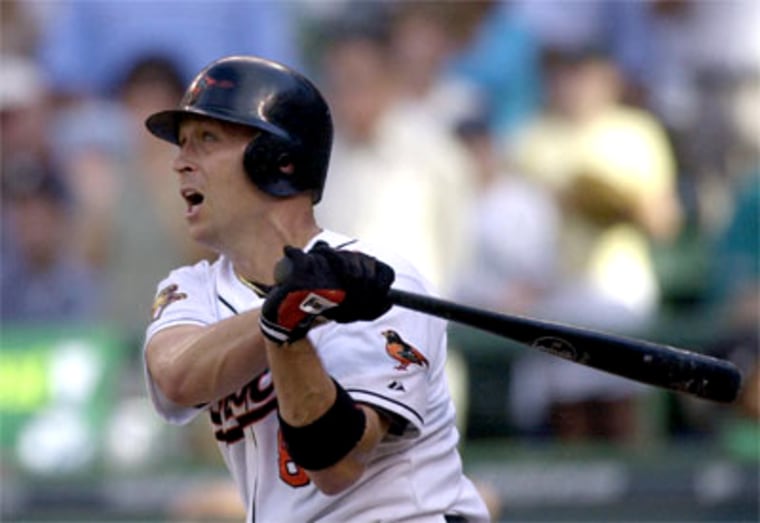The numbers would have been enough. Over the course of his baseball career, all of it with the lowly Baltimore Orioles, Cal Ripken Jr. racked up 3,184 hits, drove in 1,695 runs, smacked 431 dingers, played in 19 All-Star games, earned two Most Valuable Player Awards, bagged two Gold Gloves and won a World Series.
But for all his accomplishments with his bat and his glove, Ripken, elected into baseball’s Hall of Fame in January, will always be revered for “the streak.” From May 30, 1982 to Sept. 20, 1998, Ripken played in 2,632 consecutive games, shattering Lou Gehrig’s record of 2,130 games, and earning him the moniker Iron Man.
Since retiring in 2001, Ripken has channeled that tenacity and brand power to build a thriving baseball empire. Aided only by a few business managers, a publicist and his brother Bill, Ripken oversees the entire operation — from raising capital for the construction of baseball fields at his youth camps to attracting advertising for his minor league stadium.
“When I retired, I wanted to develop businesses around the grassroots of baseball,” he says. “The game is a focal point for a lot of communities.”
And that means synergy. His holding company, Ripken Baseball, contains two minor league teams, two youth instructional complexes and an autograph authentication business. Ripken also gives speeches, endorses trucks and hotels and co-hosts an XM Satellite Radio program with brother Bill, former second baseman for the Orioles. To that add five books, including two recent tomes: "Get In The Game" hammers home Ripken's so-called principles of perseverance, while The "Longest Season," a children’s book, focuses on dealing with adversity. “Kids need to know that they have to push through the bad times as well as the good," he says.
These efforts all feed off one another. For example, the massive baseball complex he built in his hometown of Aberdeen, Md., is home to both one of his teams and his instructional summer camps — an ideal set up for enticing youngsters who attend the pro games with their families. And when Ripken does an endorsement, he asks the company he is pitching to become a partner with him on one of his businesses, rather than just shelling out a flat fee. Comcast and Chevrolet have signed on so far.
Calvin Edwin Ripken Jr. was born Aug. 24, 1960 to Violet and Cal Ripken Sr. Dad set the tone: A minor league baseball coach and manager, he always preached the importance of showing up everyday to work, developing positive relationships and practicing perfectly.
Here's classic Cal Sr.: After he and the four kids would finish shoveling their driveway following a heavy snow storm, writes Junior, the group would move to the sidewalks — and then to the neighbors' driveways. Dad was often on the road coaching, and knew that a favor to his neighbors in the winter would be repaid during the summer when he was away.
After retiring, Ripken Jr. was bombarded with requests to lecture on the merits of persistence. (Get In The Game is an extension of the speech he wrote for the appearances.) But Ripken is more about action, not talk.
In 2002 he bought what is now called the Aberdeen Ironbirds, the Orioles’ rookie-league team. To house the Ironbirds, Ripken erected 6,000-seat Ripken Stadium; later he added several gorgeous youth fields modeled after famous ballparks like Camden Yards, Wrigley Field and Fenway Park. “On one side of the complex you have the dream," he says. “On the other you have a place to learn how to achieve it.”
Teaching kids is Ripken’s deepest passion. At the Aberdeen complex, he and brother Bill run summer instructional camps for players as young as age 5, teaching baseball “the Ripken Way.” Recently Ripken broke ground on a little league tournament complex in Myrtle Beach, S.C. — a place where families can vacation while their sons and daughters play. The facility will host its first full summer this year.
Ripken's other hot market: hard-core fans. Always willing to sign an autograph and irked by shady memorabilia dealers, the Iron Man started Ironclad Authentics, which sells balls, bats and jerseys signed by 75-odd baseball heroes, including Don Mattingly, Ernie Banks and Yogi Berra.
Ripken won’t comment on his company's financials, other than to say each unit is profitable and that he prefers to reinvest the cash he makes back into baseball. “I’d love to have 10 or 12 youth complexes,” he says.
Still, all the scratch his businesses throw off could be aimed at something bigger. The Orioles haven’t had a winning season for almost a decade, leading many to suggest Ripken should buy the team from current majority owner, lawyer Peter Angelos. Unpopular with the team’s die-hard fan base, Angelos has given no indication he intends to sell the team — though he and Ripken reportedly have dinner from time to time in Baltimore. If he does make a play for the team in the future, Ripken will need partners: Forbes estimates the team is worth in excess of $350 million.
“If the Orioles became available, I would certainly love to put together a group and try to buy the team,” Ripken says. “I have several ideas and philosophies I think could benefit the entire organization, from the farm system to scouting to the Major League ball club.”
While he waits, Ripken continues to show up for work every day. “You’d think all this would be easy with a background in baseball, but it’s not," he says. "It requires capital, infrastructure, training and organization — plus a lot of work.” The perfect gig for an Iron Man.
